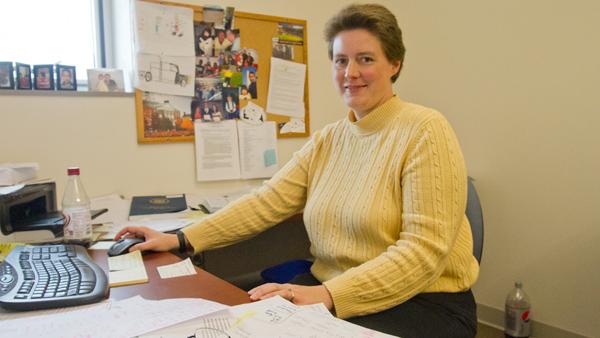Ithaca College is taking the final steps toward institution-wide implementation of electronic learning portfolios as part of the new Integrative Core Curriculum.
E-portfolios are online portfolios that showcase student work, including writing samples, projects and experience, for potential employers. The new e-portfolio platform will be used as a way to assess integrative learning that will happen with the new ICC, and it will be a graduation requirement for all students.
E-portfolios will be required for all incoming students beginning in the fall of 2013, Danette Johnson, director and professor for educational affairs, said.
“The core curriculum is going to start in the fall [of 2013], and the expectation is the electronic learning portfolio is a component where all students are going to be able to integrate and document all elements of their learning,” Johnson said.
The e-portfolios will use Taskstream programming. Taskstream is a company that provides online tools for assessment, accreditation and e-portfolios for educational institutions.
An e-portfolio pilot program was scheduled for this semester, as stipulated by the ICC Implementation Timeline, but it was delayed until the spring.
“In an ideal world everything would move more quickly, and it would get started a little sooner,” Johnson said.
The pilot program will include about 100 students in academic writing courses, students in the Leadership Scholars program and Resident Assistants. Additional students may be added as well, Johnson said. Also in the spring, faculty groups will work on creating a rubric for portfolio assessment, and they will work with existing Web Profile Manager portfolio software users at the college to identify data transfer processes.
Freshmen will be introduced to the portfolios and ICC through the Ithaca Seminars, interdisciplinary liberal arts courses required for all first-year students.
E-portfolios will replace some of the current assessment methods of student learning that happen in each school, Johnson said.
For example, humanities and sciences faculty currently assess general education programs based on the college’s mission statement on a course-by-course basis, using different definitions of what constitutes student achievement of the general education learning outcomes, Johnson said.
“By moving to an institution-wide system, where faculty will develop common definitions of what constitutes student achievement of the learning outcomes, we as a faculty can get a clearer sense of the learning that’s taking place,” Johnson said. “Taskstream provides a means to have a common definition of achievement while also allowing students to demonstrate that achievement in a variety of ways.”
However, Taskstream will not replace, but supplement, the assessment of academic major programs. Johnson said that in many cases the potential for automated collection of information and rubrics may streamline student performance evaluation processes and allow for more data to be stored.
Some schools, such as the Roy H. Park School of Communications, will use the e-portfolios as a supplement to their student learning assessment. Diane Gayeski, dean of the Park School, said communications students will be required to take a class senior year dedicated solely to e-portfolio development. Currently, the school of communications offers a freshman class, S’Park, which requires e-portfolios. However, students are not required to continue building the portfolio after leaving the class.
“We do require that students take a class in social studies and a class in humanities; it’s kind of our own distribution requirement with the idea that we want them to have a broader education and experience things that are not just professional education,” Gayeski said. “But we’ve never had a way to assess what’s happened there, whether students actually put it together in any meaningful way. It just is ‘you need to take four courses.’”
Though the ICC will institute e-portfolios as an institution-wide graduation requirement, some programs and departments already require them as part of the curriculum. Currently, all education, recreation and leisure studies, aging studies and physical therapy programs require e-portfolios.
Karen Edwards, associate professor of health promotion and physical education, was the chair of the Academic Assessment Committee during the 2009-10 school year and co-chair of the Academic Assessment Committee during 2010-11.
She was also part of a committee that reviewed possible programs, cost information and technical recommendations.
Teacher education programs on campus have required e-portfolios for about four years to report to their accrediting organization, which was recently changed to the National Council for Accreditation of Teacher Education from the Regents Accreditation of Teacher Education, Edwards said, and all students in the health promotion and physical education department — including non-teaching majors — are required to have a portfolio.
“What we found is the students who are not teacher education students really enjoy having a portfolio, because when they go out for jobs they can bring their iPad and pull up their portfolio and show their work,” Edwards said.
Taskstream also allows students to create different versions of their e-portfolio if the student needs it for several purposes, Johnson said.
Junior Monica Weimer, health education and physical education student, said an institution-wide e-portfolio requirement is a great idea because it encourages students to put more effort in the work they do for their major. She said she will be sending her own portfolio to prospective employers once she graduates.
“It is extra work, but if it’s something that is going to help me get a job, then I am more than happy to do it,” Weimer said.








